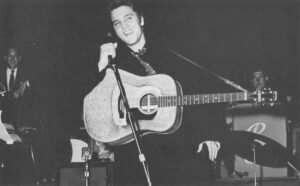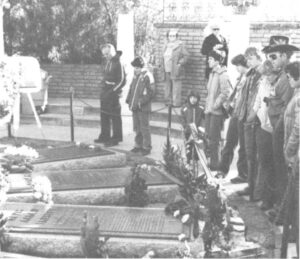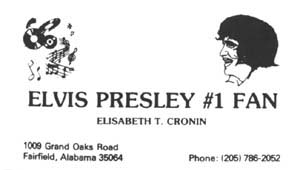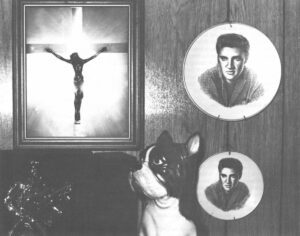MEMPHIS, Tenn.–The woman is an Elvis fan from Boston. She is in her mid-thirties, has dark hair, and is thin, in that pale, pinched way that comes with being nervous.
At the moment she is listening to one of the many Memphis men who dyes his hair the color of Elvis’s, wears Elvis style sunglasses, drives the inevitable Cadillac, and claims to have been well-acquainted with Elvis Presley, but wasn’t.
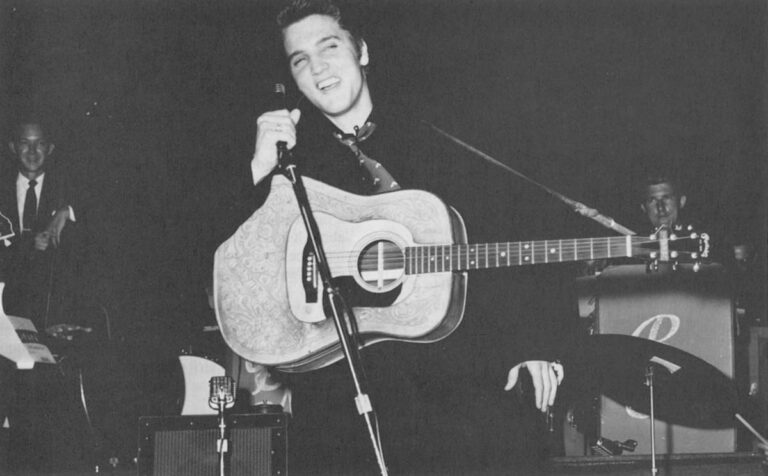
He is recounting a few all too familiar tales, stories of the King of Rock and Roll, who escaped the poor boy’s trap of anonymity and hopelessness he was born to, and lived out the promises of the American Dream, only to discover that an equally rigid entrapment exists in the fame, wealth, and power that Americans have historically equated with being free.
But now the man in Memphis talks of Elvis Presley in the most pejorative way, and the agitation of the Boston fan manifests first in her fluttering hands, then in her eyes, and then in tears. He talks on. She covers her ears with her hands. “Oh, please,” she says, “Don’t you know any happy stories?”
This is the point about happy stories: they are confirmation that Elvis himself was happy in the role his fans thrust upon him as Number One Custodian of the American Dream. To believe in his happiness is to believe in the Dream, and for that reason Elvis fans still tell their happy stories, despite all that has lately been said and written, and, of course, because of it.
These stories insure the persistence of Elvis Presley’s myth, but beyond that, they prove that legends and myths themselves exist because human beings are often fragile and often afraid and need them.
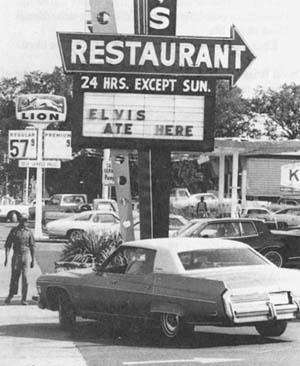
Then there is that set of stories told by those who knew Elvis Presley. Stories that strongly suggest that Elvis, who had an abundance of those things that are regarded as significant and worthwhile, could nonetheless find no real sense of life’s meaning, though whether that qualified him for pity or scorn depends entirely on individual perceptions. Underlying this group of stories is a common thread: that the ability to do whatever you want whenever you want to, that definition of personal freedom derived from such classically American figures as Huckleberry Finn, is, in practical terms, not without its danger, and is perhaps not such a great thing after all.
“I have no room to breathe,” Elvis had said in 1970, seven years before he died, to Ray Walker, one of the Jordanaires, the vocal quartet he had worked with from almost the very beginning. “Breathe anyway,” Walker had told him. “I can’t,” Elvis said. “Kings don’t fall and gods don’t breathe.” And then he had grinned, though it seemed to Walker that in a sense he wasn’t kidding.
I have listened to Elvis stories for almost a year, but never heard one without thinking, incongruously enough, about the King of Rock and Roll in terms of an e.e. cummings poem about a mouse. The mouse is trapped and it is dying. The poet looks in its small mouse eyes. Here is what the poet thinks the mouse is saying: What have I done that you wouldn’t have?
The other thought I have had while listening to these stories is the obvious one about the division between illusion and reality.
These Foolish Things
Bonnie Grim, male, 42 years old, lives in Oklahoma City, aircraft mechanic, Elvis fan.
I never knew the man personally. From everything I’ve read he had all the values I do. Traditional values. Like going in the army. He didn’t have to do that.
He accomplished the ultimate goal. Total power. He loved power and he was able to do what he wanted because he had the power to do so. If I had been Elvis, I’d have done what he did. I’d stay right where I grew up. I’d build my own little empire. I’d keep the same friends I had all my life.
Elvis, he just had everything. He did what he liked.
David Briggs, lives in Nashville, acknowledged to be one of the finest musicians in popular music. Worked with Elvis from 1970 to 1976.
I use the word boredom in relation to Elvis. It’s the most harmless word to use. But there’s no question that drugs had more to do with it than boredom. A lot of people are bored. I’m sure Frank Sinatra is bored. But he’s kept it together to a certain point. I don’t think boredom is a good excuse. I think drugs are a good excuse. If you get hooked on them.
I would say that the worst time for Elvis went from that show we did at the big stadium in Pontiac, Michigan, New Year’s Eve, 1975. That show was bad; it was a bad night for him.
And from that night on until the day he died I would think would have to be the worst period of his life, psychologically, physically, emotionally, every way. From then on he went all the way down and never came back up. Oh, he might rally occasionally, he might hesitate for a moment, but then he would stumble again, and he just went down, down, down.
Felton Jarvis was Elvis’s producer for almost twenty years. He died, at age 46, in January 1981. He once told the following story to a friend of his and of Elvis’s, who asked that it not be directly attributed.
A year and a half before Elvis died, in February, 1976, he recorded, for the last time, enough songs for an album of completely fresh material. RCA had been unable to get him into a studio, and they had finally set up a studio in the living room at Graceland. They cut 12 songs in eight days, and though Elvis never wrote his own material, he frequently recorded songs that were indicative of his state of mind. Some of the songs recorded in those sessions were: “Hurt”; “I’ll Never Fall in Love Again”; “The Bitter They Are, The Harder They Fall”; and “Solitaire”, which Elvis seemed fixated on, and which tells the story of a lonely existence. He also recorded “Danny Boy,” his mother’s favorite song, which he had been meaning to record for a long time.
On the last night, Felton Jarvis and Elvis walked outside and stood on the Graceland lawn. Elvis had said, “I’m so tired.” “You need some rest,” Jarvis had agreed. “That’s not what I mean,” Elvis had said. “I mean: I’m just so tired of being Elvis Presley.”
Norman Conlon, 25 years old. He is crippled, lives on welfare, a resident of Memphis.
Oh man, to be Elvis Presley, oh man. You’d just look at the female with those sleepy-type eyes. And that is all you’d have to do. Oh man, after that it’s all up to the female. She’d come right to you, too. She might have all the willpower in this world, but you’d put out that willpower. You’d be Elvis Presley, and she’d come right to you. Right to you and those sleepy-type eyes.
Linda Thompson. Lived with Elvis Presley from 1973 to 1976.
Elvis used to say, “I’m really just a little baby. Onstage I might be this sex symbol or something, but when I close the door at night I like reverting back to just being a child.” Often, we were little children together, talking in baby talk.
I saw Elvis as very much a victim of life, of his own fate. But he had grown so acclimated to his way of life, to staying up all night and sleeping all day, to the darting in and out of garbage routes and service elevators that it had become a normal way of existence for him. But it bothered me a lot, and there was a time when I said, “God, I’d like to whisk you up in my arms and take you away to the country.” And he laughed and said, “Well, what the hell for?” And I said, “To get you away from all this.” And then he got mad and said, “Hey. It’s my life.”
Kathy Burnett, psychology student at Memphis State University. Daughter of Hobart and Bonnie Burnett who own the Hickory Log, the cafe across the street from Graceland.
In October 1976, just before Linda and Elvis broke up, we were all sitting around the Hickory Log about four in the morning, still hoping Elvis might come out that night, even though it was getting towards dawn. And then somebody hollered, “Hey, Elvis is at the Vickers gas station up the street,” so we all ran up there and he was getting gas for his motorcycle and for the ones he bought the guys in his group. There were a lot of fans there and people were taking pictures and he was talking and signing autographs and was saying how he was superstitious and into numerology and then he showed us this ring he had just gotten and everybody gathered around to see it, and then someone said, “Let’s go Elvis, we’re drawing a crowd.” And he said, “When we stop drawing a crowd is when we have to worry because that’s when we stop driving new motorcycles.” I guess he realized that his fans were his fame and his money and that everything he had was the result of their spending the money they had on him.
A few months later some of the same fans were sitting in the front row at one of his concerts and he was showing the audience that same ring, and he looked at those fans who’d been at the gas station that night, and said, “I know you’ve already seen this, but bear with me for a minute.”
Ginger Alden, Elvis’s girlfriend from November 1976 until his death in August 1977.
The night I met him he took me to his room and pointed out the window, the one that looks out on Elvis Presley Boulevard? And he said, “I’m not like that street out there. If you cut me I bleed.” And then he looked at me real hard, like he wanted to be real sure I understood what he was saying.
Billy Smith, Elvis’s first cousin, was raised with Elvis, and later lived behind Graceland in a trailer.
Elvis was real fired up after he met Ginger. He lost some weight. His shows started getting real good again. Two nights before New Year’s Eve 1976 he came offstage and I said, “That’s the best show you ever done.” And he said, “Wait ’til tomorrow night.” Well, that one was even better, and when I told him so, he said, “Wait ’til tomorrow night,” again. Well, that was the night of the New Year’s Eve show in Pittsburgh, and it probably was the best show he ever did give. And that’s what I told him when he came off, and he just kinda nodded and didn’t say anything. It was like he knew he’d never do a show that good again, and he never did.
Shaun Neilson, sang tenor with Elvis, considered to have been the singer Elvis most admired.
After a concert when he was bad, and he was bad a lot toward the end, everybody on stage would basically look at each other and say, you know, where can we hide. You felt bad for him. I always did my absolute best because I felt he got some of his motivation from where I was and I always worked as hard as I could to give him energy and motivation. But there were times when I don’t care what you did, there was no way to move him. There was only so much you could do. But even when we did a really bad show the audience didn’t care. He’d been there and that’s all they came to see. Essentially many of them didn’t even care if he sang. Basically, that was the problem. That doesn’t leave much room to be challenged. He could have weighed 250 or 300 pounds and hummed. He could lay down on the stage and fall asleep and they’d still have thought it was the greatest thing they’d ever seen.
After he died I thought I should have seen it coming. But somehow you never thought he’d die. Somehow, in spite of everything you could see, you thought Elvis Presley was immortal. That he’d just go on forever.
Mae Borden Axton, resident of Henderson, Tennessee, wrote Elvis’s first major hit, “Heartbreak Hotel.”
I felt like a mother to Elvis. I had known Gladys, his mother, and maybe that has to do with why I felt that way. In that last year he was sick so much of the time, and in April he was hospitalized and his Daddy called me and asked would I come to see him. Well, I got there, and Elvis was lying in the bed, and he looked so sick and awful. And he took my hand and I sat on a chair next to the bed. And I never will forget what he said. He said, “Mae, I’ve been everywhere and I haven’t seen anything. I’ve met a million people and I have no friends.”
Bob Hammerschmidt, Elvis fan, policeman in Lower Merion, Pennsylvania.
Everybody loved Elvis. He had a charisma. I never saw anything like it and I’ve guarded Kennedy and Nixon and I had breakfast once with Lee Marvin.
He came to Philadelphia in May, just before he died in August. He didn’t look well but he told the audience, “No matter what you hear, no matter what you read, I’m in good health.”
Barbara Keener, housewife, Elvis fan, lives in Huntsville, Alabama.
Elvis was in Mobile on June the second, 1977. He was supposed to have been there in April, but he was sick, and had to cancel. This one feller was there in Mobile at this shopping center and he had set up kind of a booth and he had this big book where all the women of Mobile who were coming to the concert could sign their names ,cause Elvis was coming. See, and then he’d give the book to Elvis.
The first page was taken up but the second page is where I wrote mine. I wrote a nice long letter and signed my name and everything. The man who had the book, at the concert the night before, Elvis had given him a ring. Ooh, ooh, what a ring, so beautiful and so full of diamonds and everything. The reason Elvis gave him the ring was that this man stood in line three days to buy a ticket to the show. And so someone had told Elvis about it and Elvis gave him the ring to show him how much he appreciated that. So anyway, getting back to what I was telling you, the concert started on June the second, and the man presented Elvis with the book. He said, “We have a book we would very much like you to have from the women in Mobile who love you and care about you so much.” And Elvis came and got the book and he looked through it and he thanked us and said the book was something he’d cherish the rest of his life.
Kathy Westmoreland, sang with Elvis in concert from 1970.
One night, when we were on the road, sometime in June, my phone rang about four in the morning. We’d done a show that night, and of course when I answered the phone it was Elvis. He said, “I’m sorry to wake you up, but there’s one thing I got to ask you.” I said, “What is it?” And he said, “What’s it all about?”
Angie Simpson, teacher, Elvis fan, wife and mother.
In June 1977 1 finally got to talk to him. I had gone to Memphis for the weekend and he had just come off tour and the fans in Memphis kept saying, you know, after he’s home about a week he’ll start coming out again. So every night I’d call my husband and tell him: Just one more night. But Friday was absolutely the last night I could stay.
So that night we waited at the gate and around midnight all of a sudden there was this flurry of activity and then he just started coming down the drive on his motorcycle. It was Elvis and Ginger and Billy Smith and his wife, and they headed downtown and we got in a car and went after them.
Then he pulled into a gas station and we pulled in next to him. So did the two other cars that were following him. These men got out of the other cars and they talked to him first and then me and this woman from Memphis, who’d met him a lot of times, walked up to him.
I always said that if I ever got to meet him I would never be able to say a word, but I rambled my head off. I asked could I have an autograph, ’cause I had a picture of him I’d been carrying around all week just in case. I handed him the picture and he said something like, “That’s a new one,” and I said it was taken in Huntsville in 1975. So he signed and then I said, “Do you have time for a kiss?” And he said “Yes,” and then he leaned over and kissed me and I made some kind of little involuntary noise I wasn’t even aware of and he just cracked up. Then he smiled at me, and got on his motorcycle and rode off. I couldn’t actually believe it had happened. He had touched me and he had kissed me and it was all right there, and I had stood there and talked to him, but still, but yet, that was Elvis Presley, and that’s impossible.
Ginger Alden
A week before Elvis died he took me to his trophy room. He had so many gold records and awards. He just kind of stood there in the middle of the room and looked around real slow and then he said, “Sometimes it’s like all this happened to somebody else.”
Philip Sanders, Elvis fan, carpenter by trade, lives in Madison, Wisconsin.
I used to fantasize about meeting Elvis. I would think about what I would say to him. The only thing I really wanted to say was Thank You. But now, with all the gossip and bad things that are being said about him, if he could come back to life for ten seconds, and I could be with him, I would put my arm around him and say, “Don’t worry about it. You made a lot of people happy. You did all right.”
©1981 Elizabeth Kaye
Elizabeth Kaye, a freelance writer from Santa Monica, California, is studying the phenomenon of Elvis Presley in American life.

